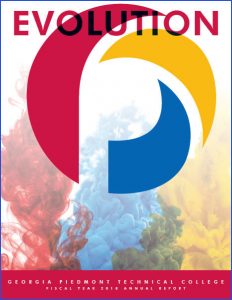Vision
To create unforgettable learning experiences.
Our vision describes the ideal result of our work. We foster learning to our students and among one another that makes a positive, lasting impact. If we embrace our values, achieve our goals and succeed in our mission, our vision will be realized.
Mission
Georgia Piedmont Technical College, a unit of the Technical College System of Georgia, promotes workforce development within a learner-centered environment through adult education, technical education and customized business and industry training in DeKalb, Newton and Rockdale counties. GPTC offers learners the opportunity to enhance, refine or develop their education, earning associate degrees, diplomas or certificates through traditional and distance delivery methods.
Values
Our values are internally-held principles from which our culture stems. Our values guide the attitude and intention with which we approach our work.
Learn
Be teachable. Use knowledge effectively. Challenge others to learn.
Recognize the need for change.
Serve
Be mindful of people’s needs. Engage positively when interacting.
Be forgiving of inconveniences.
Lead
Influence with integrity. Own the work. Respect diversity.
Take initiative developing solutions.
Strategic Goals
These goals will be the focus of our work throughout the next five years. Divisional, departmental and individual objectives are aligned to these institution-wide initiatives.
Read Georgia Piedmont Tech's Strategic Goals
Goal I: Promote Student Success
In whatever manner students engage with the college, we will build an environment that supports their success.
- Implement instructional best practices to enhance student
learning and foster an inclusive learning environment - Offer educational programs to match the specific needs of the college’s service delivery area with a special emphasis on
high-demand careers - Strengthen Adult Education sites
- Develop initiatives to transition students from Adult
Education to credit-based programs of study - Initiate a student-centered completion campaign that
encourage full-time enrollment - Increase student involvement in clubs and organizations
- Improve the quality of distance education courses
- Identify and develop programs that encourage quick, efficient
program completion, including distance education offerings - Evaluate academic program performance to ensure quality, vigor and relevance for the world of work
Goal II: Foster Engagement
Both internally and externally, we will connect with intention and remain unified in pursuit of our mission.
Learner-centered Objectives
- Facilitate a responsive, learner-centered culture that promotes learning, service and leadership
- Engage community partners in developing effective and efficient credit and non-credit programs that support students’ attainment
of relevant skills - Strengthen relationships with local school districts to create
seamless pathways for students
Employer-centered Objectives
- Conduct needs assessment and offer educational programs that
meet workforce demands of the service delivery area - Deliver high-quality, customized contract training to enhance
workforce skills with an emphasis on high-demand career fields
Community-centered Objectives
- Increase visibility of the college in each county served through social media and targeted outreach activities
- Develop and implement recruitment activities targeted to
introduce middle school and high school students to technical
education programs with a special emphasis on high-demand
careers
Employee-centered Objectives
- Promote an environment that supports and recognizes learning, service and leadership, for both full-time and part-time employees
- Invest in professional development activities that are inclusive of all employees
- Establish greater opportunities for employees to participate in decision-making processes
- Provide exemplary orientation for all new employees
Goal III: Strengthen Infrastructure
From physical facilities to processing procedures, we will operate with strength and stability.
- Implement a user-friendly, institutional dashboard for daily,
monthly and annual reporting functions - Implement the 2020-2025 Master Plan
- Identify and pursue funding sources beyond state and federal
allocations to include grants, scholarships and charitable
donations - Improve and expand physical facilities to better serve the service delivery area
- Enhance information technology infrastructure to support student learning and operational efficiency
- Enhance Campus Security measures with a special emphasis on
staffing, training and leveraging technology


